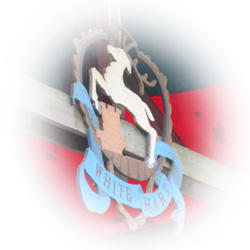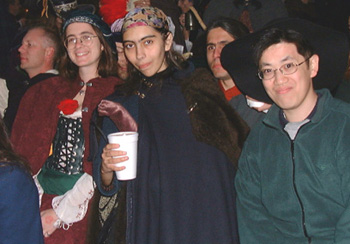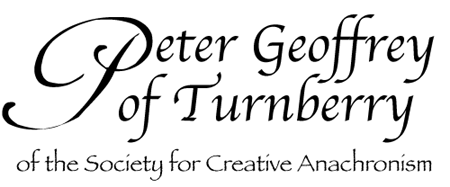the periphery

home 
|
  Tales: The Last Song A tale from the fall of 2004; a story of love, and courage, and defiance, and one last song at White Hart Tavern. A story of the last song of the year, the song that wasn't on the set list...
At Pub Sing, there are many fun traditions -- like the comedic antics of Jack Rackham, the genial master of the Pub; the fire-eating/breathing at the White Hart statue itself; and of course, the singing. Many of the Faire's performers come up for one last set of songs. Many songs are rousing and rowdy -- I Come to Sing and All for me Grog are lively celebrations of the cameraderie of the Tavern; A Sailors Prayer is an irreverent romp. Many of the songs are more touching, more wistful. Pubsing, while open to the public, is also heavily populated by those most close to the Faire, be they the actual performers in the Faire, like my friend Eowyn, or my violinist friends Cyd or Claudia, who often performs on the Pubsing stage, or simple almost-every-weekend regulars, like the stylish rogue Matthew, or the dancers of Thrir Venstri Foetr. The Pubsing is a place for those who hold the community of the Pub most dear to celebrate and gather. Every night has songs wistful and touching to go with the wild and silly, every night, especially the Last. There, in the late-autumn darkess lit only by the warm lights of the stage and the flicker of patron's table candles, under the trees, under the stars, packed together with friends, the people of Revel Grove share together the magic of music and each other, one last final time. And this year, I was lucky enough to join them.

The crowds of regulars were already packed in by the time the Last Pubsing began, a half-hour earlier than usual, so that it could go longer. Imagine a party that lasted every weekend for an entire season, and then imagine the very last party at the end of it, and you can imagine what one friend of mine meant when it was said the place was filled with happy tears. The Pyrates Royale, the Crimson Pirates, Wolgemut, everyone had their last raucous turn on stage. And then into the emotional traditional finales: Carrickfergus; Health to the Company; Jack Rackham's moving signature hymn, which I later discovered is actually a folk tune by Tom Wisner recorded decades earlier:
I remember how I filled with pride to hear my father say, Dreams are like a mainsail set high upon the mast, And you run before the free winds as long as dreams can last. Then I growed and went to school to learn that dreams ain't real. They taught me how to calculate and hide the things you feel. Well I know that in me no harm, but this their learning said, A man's a man in this here world, and if you dream you're dead. Well forty year's I've been livin' in my dreams, Reality confuses me with its many schemes. I'll take the weathered tapestry that's folded in my soul And run before the moonlit winds with the love I know --
Need all the mending that they can get. No time to be a-tending; the wind's alive today. These sails are worn and weathered and I'm bound to go my way. Jack Rackham read his last closing piece. The Queen gave her last farewell. The eight bells are rung, the bells first rung, I was told, in the year the Faire lost the beloved gentleman who had played the Faire's King for many years, and rung ever since in memory of the lost from season to season. The cannon was fired for the last time. There were hugs, and tears, and glasses raised. And then, just as the gathered company was about to dissolve for the last time, from somewhere in a corner, the last song began.

And the trees are sweetly blooming, Where the wild mountain thyme Grows around the blooming heather: Will ye go, lassie, will ye go?
And the leaves are gently falling, Where the wild mountain thyme Grows around the blooming heather... By itself, it would have been a special end to end a special evening, at the close of a wonderful weekend, at the close of these past wonderful years. But what I later learned about *why* that last, unplanned song had happened pushes the moment from special to the stuff of legends. For the song, as it turns out, wasn't just a spontaneous song that happened to erupt. Well, not entirely. The Pub itself, and the performers on stage, hadn't planned on singing it, yes. But one man in the audience had, planned to sing it even if noone else would. Sing it for the Lady he dearly loved.
Some solid tumors in adults are, relatively speaking, not all that dangerous, and easy to cure. It is my sincere hope that what she had was one of those "simple" benign ones. But other forms of solid tumor cancer that require both surgery and chemotherapy are among the deadliest cancers known to man. Some of the most daring and desperate surgeries in all of medicine -- like the infamous Whipple, which at one point killed 25% of the patients who had it -- are the last-resort measures needed for these most dangerous adult solid tumors. Cancer's weird in that regard; unlike many lethal diseases, you can feel just fine for months while harboring a deadly cancer within, walking around nicely with a lump of tumor in your gut. Unlike a cornary heart blockage, most solid tumors don't require you to be hauled right into the operating theatre -- you can schedule these things at a (relative) leisure, like, say, until after the last Weekend at Faire. On the flip side, unlike something like a bypass, after cancer surgery the fight is only beginning. Chemotherapy is needed to hunt down and root out the last microscopic bits of tumor the surgeon couldn't get; in a bad case, those tiny bits survive and regrow elsewhere, necessitating the whole thing once again; in the worst case, the tiny trailing bits turn metastasize into something virulent and incredibly deadly. I have no information about what kind of cancer the gentleman's lady had. I sincerely hope that it was something simple, easy, and cureable. I hope that her surgery was thought to be a pretty probable cure, rather than a desperate, and realistically hopeless, measure. I have no way of knowing. And nor, really, does it matter. Wild Mountain Thyme was her favorite Pub Sing song. For some reason, this Pub Season, it was not sung at Pub Sing, and she missed it greatly. So he resolved, together with the small circle of their friends, that if it was not sung again that night at the Last Pub Sing, that they would sing it for her. What he *wasn't* expecting was for the entire White Hart Tavern to join in. Everybody would be caught up in their goodbyes, in their farewells, in their until-next-years, and in that bustle, surely it was unlikely that others would even hear the song they were singing. To have the small group of their friends raise the song one more time for the lady he loved would be enough. But that's not, of course, what happened. The Pyrate Queen sang. Jack Rackham sang. The King sang. The Pyrates Royale, and the Crimson Pyrates sang. Eowyn, and Matthew, and I know not who else from these diaries that I did not see that night sang. Jesse, and Morwen, and I, and every other man and woman in the White Hart Tavern sang, raised our voices, raised them high, and somewhere at the heart of it all, a gentleman, and the lady he loved, and their circle of friends, surrounded by a dozen dozen voices singing forth a lady's favorite song. I can guess what the gentleman at the heart of it all felt. I've had the privelege of working with the families of cancer patients, and while mine were all children and teens, the feelings are surely the same. I can guess at his fear and frustration, knowing that the life of his love rested now in the hands of others, with little now he could do to swing the outcome. Rested in the hands of the surgeons and the oncologists, the nurses, the techs, the scientists, and whatever God or gods or fortunes they believed in, with little left that he could do. He knew the odds, be they good or bad; and even under the best circumstances, the uncertainty of what the future held, and how much suffering, and fighting, and pain, would lie ahead. With a future full of fears, and a near impotence before the deadly problems the woman he loved faced, he did the one thing he could do. He gave her the one thing he could give. Against a deadly enemy he could do virtually nothing about, he raised the one act of defiance against despair he could, in the gift of his song. And a hundred voices joined him.
And we'll all go together To pick wild mountain thyme All around the blooming heather... Will ye go, lassie, will ye go? Postscript: I later learned his name was Jeff. Her name was Bonnie. She had been diagnosed with gallbladder cancer, one of the deadliest solid tumors known. She did survive her surgery, and fought on valiantly beyond that, for almost another two years. In the end, she finally lost her struggle in July of 2006.
Source: Original Usenet Post, 12/23/05, alt.fairs.renaissance
| |
|
All materials copyright Jeffrey Huo, 2005, 2006 jeffshuo@alumni.northwestern.edu |
